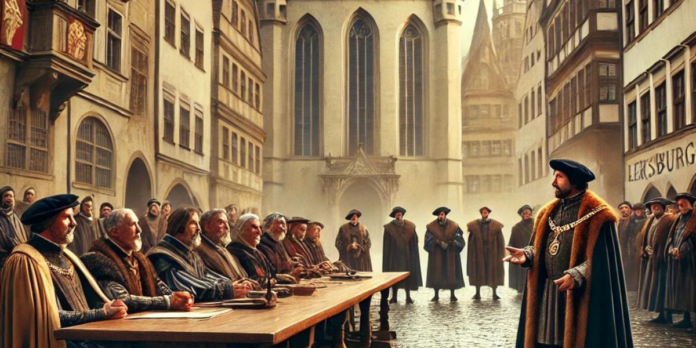When you think of Conrad Peutinger II 1475, you might not immediately think of ancient maps and Roman roads.
But that’s exactly where his legacy lies.
Conrad Peutinger II 1475 was a Renaissance scholar who had a fascination with all things Roman, particularly the road networks that connected the empire.
This passion led him to acquire the famous Tabula Peutingeriana, a Roman map that shows routes across the ancient world.
But what drove him to dive so deeply into Roman history?
And why does ConradPeutinger II 1475 still matter today?
The Early Life of Conrad Peutinger II 1475: A Scholar in the Making
Born in Augsburg in 1475, Conrad Peutinger II grew up in a world brimming with cultural and scholarly pursuits.
From a young age, he was surrounded by books, ancient artifacts, and an endless curiosity about the past.
His education at the University of Basel and the University of Padua gave him a solid foundation in law and Latin, setting him up to become a respected scholar.
For ConradPeutinger II 1475, this was just the beginning.
His studies paved the way for a lifelong obsession with Roman history and the treasures it left behind.
Conrad Peutinger II 1475 and His Fascination with Ancient Rome
Why did Conrad Peutinger II 1475 care so much about Roman antiquities?
During the Renaissance, scholars were rediscovering ancient civilizations, and for ConradPeutinger II 1475, Rome held a particular allure.
He saw the Roman Empire as a cornerstone of history, with lessons that were still relevant.
It wasn’t just about studying ancient artifacts; for him, it was about connecting with a civilization that had shaped the world he lived in.
Peutinger’s approach was more than just scholarly; it was deeply personal.
He believed that by preserving Roman history, he was preserving a piece of himself.
The Tabula Peutingeriana: Conrad Peutinger II 1475’s Most Famous Treasure
When we talk about Conrad Peutinger II 1475, we can’t overlook the Tabula Peutingeriana.
This ancient Roman map wasn’t just a curiosity—it was a groundbreaking discovery for the time.
The map, which is over 22 feet long, details the network of Roman roads that stretched across the empire.
ConradPeutinger II 1475 acquired this map, which became known as the Peutinger Map, and through it, he provided a window into the ancient world.
The Tabula Peutingeriana isn’t geographically accurate, but it offers a glimpse into how Romans viewed their empire and the roads that connected it.
Why the Tabula Peutingeriana Was So Important to Conrad Peutinger II 1475
For Conrad Peutinger II 1475, the Tabula Peutingeriana was more than just an artifact.
It was a tool for understanding how the Romans connected their world.
The map includes over 500 cities and countless landmarks, from mountains to rivers.
For Peutinger, each road and city represented a story, a piece of history that had been forgotten.
By preserving the Tabula Peutingeriana, ConradPeutinger II 1475 made it possible for future generations to explore the ancient Roman world in a new way.
FAQs About Conrad Peutinger II 1475
Who was Conrad Peutinger II 1475?
He was a Renaissance scholar born in Augsburg in 1475, known for his passion for Roman history and the Tabula Peutingeriana.
What is the significance of the Tabula Peutingeriana?
It’s a Roman map that shows ancient road networks, preserved and popularized by Conrad Peutinger II 1475, offering insights into Roman travel and trade.
How did ConradPeutinger II 1475 influence Renaissance scholarship?
His work in preserving Roman maps and artifacts sparked renewed interest in ancient history and shaped how scholars approached the past.
The Legacy of Conrad Peutinger II 1475 in Renaissance Scholarship
Conrad Peutinger II 1475’s influence extended far beyond his lifetime.
By collecting Roman artifacts and manuscripts, he helped to preserve pieces of history that might otherwise have been lost.
Scholars in his time, and even today, owe a great deal to his work.
Conrad Peutinger II 1475 wasn’t just preserving history; he was helping to shape the future of historical scholarship.
His approach to studying the past has inspired countless others to dig deeper, to explore, and to understand the ancient world in new ways.
Was Conrad Peutinger II 1475 a Pioneer?
In many ways, Conrad Peutinger II 1475 was a pioneer of his time.
He wasn’t the only scholar interested in Roman history, but he took a unique approach that set him apart.
For Peutinger, history wasn’t just something to study—it was something to experience.
He saw each artifact as a piece of a larger puzzle, and he dedicated his life to putting those pieces together.
In doing so, Conrad Peutinger II 1475 paved the way for future historians and enthusiasts to follow in his footsteps.
The Enduring Influence of Conrad Peutinger II 1475
Conrad Peutinger II 1475 may have passed away in 1547, but his legacy lives on.
Thanks to his efforts, we have a better understanding of ancient Rome and its influence on the modern world.
The Tabula Peutingeriana remains a symbol of Peutinger’s dedication to preserving history, and it continues to be studied by scholars around the world.
For anyone interested in Roman history, Conrad Peutinger II 1475 is a name that stands out—a reminder that curiosity and passion can uncover the hidden stories of the past.
In the end, Conrad Peutinger II 1475 isn’t just a name in a history book.
He’s a bridge to a world long gone, a world that still has much to teach us today.
